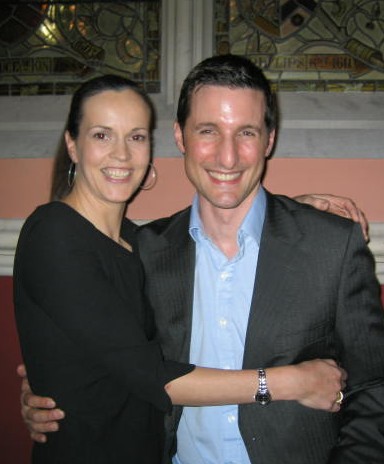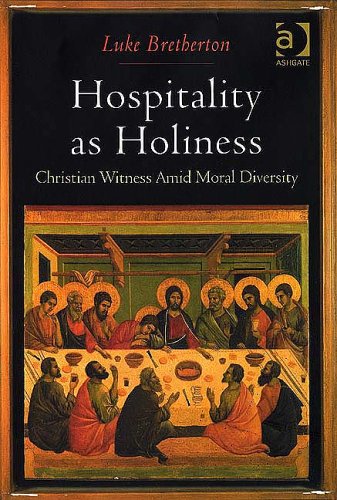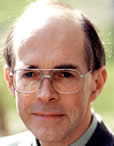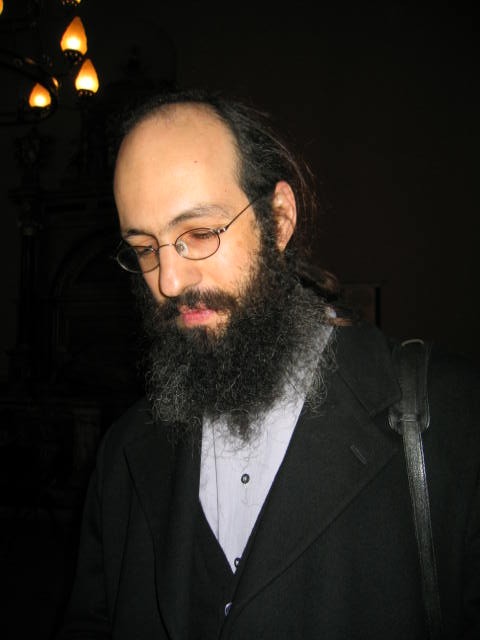Solly at Solly Gratia is reading a really tough book at the moment. He is riffing on its opening lines, just saying what occurs to him as he goes along and thereby asking all the hard questions about the context and audience, not only of this theology book, but of theology. Who is it for, and how can they hear it? I’m hoping Solly doesn’t give up – because it is for him, and not for him only but for anyone who asks.
N.T. Wright – where to begin?
Dear Bishop Tom,
I have enjoyed the Maurice lectures immensely. In your first lecture you told us about postmodernity, apocalyptic and time, and talked about the tension between the ‘now’ and the ‘not yet’, and about true and false expectation. Your second lecture, about art, suggested that good art tells us about this tension between present and future, so we understand two things about the glory of God – that it does already fill, and that it does not yet fill the earth.
Often you introduced what you had to say with the phrase ‘the New Testament narrative shows …’, or ‘the Scriptural tradition shows…’, and at other times with the phrase ‘Art shows…’. Can I ask some questions about this?
Does the bible show us…, and how does it do so? Does art show us…, and how does it do so? Isn’t there is endless wonderful disagreement and controversy about what either the bible or art shows us? How should we assess what you say they say? What criteria do you commend to us?
Isn’t bible just another text, or artwork or commodity, about which everyone’s opinion is equally valid, until we, its readers, come under some control? If your view of the bible is right, isn’t that because you have found the right control? The right control enables you, and us, to read the bible as a key to some of the other subjects you have explored …. art, culture and politics. Is there any reading of the bible that is useful until it is under some control and is honest about what that control is? The particular control that you and I advocate is that given by the Christian Church and tradition. Why be reticent about saying so? If we are not up front about this, we will be concealing our control. All other discourses – art, politics and above all, the market – conceal their hermeneutics because they want to conceal what communities, and elites, they serve. If we do not say straight out that our control is the Church and its tradition, what we have to say about art, or politics, or the bible, is just another ‘discourse’, a piece of rhetoric and power-play.
We agree, I suppose, that the bible and the Church belong to each other, each being the source and control of each other (both sourced in the kindness of God)? The bible makes Christian doctrine. The bible creates the Christian community, its form of life and the account it gives of that form of life through time, that tradition of teaching that has learned from the encounters of the bible with different cultures. Christian doctrine is the accumulated experience of the Christian community at reading (1) the bible and (2) the world. This community of the Church reads the world through the bible. Any other community or hermeneutics will read the bible through the world, and so get as many readings of the bible as there are views of the world. Have I got this right?
Why don’t we say that there is no useful interpretation of modern culture or of art that is not formed by the discipline of the Christian tradition, itself controlled by the bible (both functions of the generosity of God)? Only when we are under this control does the bible give us a distinctive Christian hermeneutic and way of approaching the world – in faith, in hope and in love, for example. Aren’t you offering the distinct Christian view without saying where it comes from and how you got to it? You are giving us your answer to the sum without giving us your workings, that is, without giving us the means by which we can follow you and come to the same conclusion.
Is there any useful interpretation of modern culture or of art that we Christians can give that is not formed by the discipline of the Christian tradition (itself controlled by the bible and by God)? Of course each of us can give our own opinions, without sourcing any of them from Christian teaching, but then the question is, what is distinct about the views we offer? Only when we are offering what the Church knows, which is different from what everybody already ‘knows’, are we doing something really useful. Are we giving what we have received (in faith, hope and love), from the Church, and which the Church has received from God? Or are we offering what derives from ourselves as individuals, so is ultimately just rhetoric and power-play?
It is good thing to be a Christian – Church-formed – reader of the bible, because such a reader of the bible may be a well-formed interpreter of art or commentator on global politics. The mind formed by the long experience of the Church shaped by the bible is a good mind, and even the secular university can concede that.
It is unfair to make this charge against you of all people because, far more than most scholars, you do display your workings. You show us the politics that drive the New Testament exegesis and hermeneutics in The New Testament and the People of God, for instance, so you offer your argument in a generously-drawn context. But, because you are a bishop (discipled by, and discipling us with, the authority of the Church) you are big enough to take this question: Have you done the same in these university lectures? In your talks so far you have not said that your views are anchored in what the whole Christian community declares publicly to the world in every act of Christian worship.
So when, in your first lecture, you took us through the doctrine of hope (eschatology), why did you not tell us that you were offering us what the whole Church offers, and teaching us what the whole tradition teaches? Why did you not once say ‘the experience of the Church on this point is….’ or ‘Christian doctrine alerts us to…’? Why not quote the teachers of the Church – Irenaeus, Augustine, Gerald Manley Hopkins – so we can look them up and begin our own acquaintance with them? Don’t tell us that Hopkins is a poet – tell us that he is a theologian, found edifying and approved by the Church. It is intellectually robust and generous to wear your colours on your sleeve. It dares other discourses to do the same. Christian faith is intellectually respectable and may be argued from at the outset. It does not require that we argue to it from some other, notionally wider, more acceptable because ostensibly more liberal, position. It is not the case that if you talk from within the Church, only the Church hears you. The world will hear too the moment the Church says anything distinctly its own.
Many thanks
Anglicanism
Over at Confessing Reader, Peter Brown’s article on the future of Anglicanism, in the United States in particular, starts by thinking through the institutional possibilities but quickly gets down to the theological motives and principles.
Here are three of the points he makes:
1 The bond of communion is a sacramental witness to the love of God on earth.
2. The catholic community is a necessary context for authentic exegesis of Scripture
3. To survive as a unified body, Anglicanism will need to develop an authoritative tradition of Scriptural interpretation. In order to provide an effective restraint, this authoritative tradition will need an institutional voice. In short, we will need something very like the Catholic magisterium; indeed, since we have retained episcopal governance, our episcopate is the natural location for such an interpretative function.
These three points are blooming obvious, so it is only a very short time I am sure before we start to hear these points being made by bishops in the United Kingdom. After all it is exactly these three points that make a bishop a bishop.
Whose crisis?
Here is more provoked by O’Donovan’s move (see post below).
In every university in the UK administrators are making it difficult to do any academic theological work. But administrators don’t start out as administrators, but as academics, people excited by ideas. But those academics who do not care to explore the wonderful world of the Western intellectual tradition right back to its beginnings, are very likely to run out of ideas. Then they will lose interest in their subject, be attracted by anything that relieves of what they will then see as the burden of teaching, they will be drawn into preoccupation with syllabuses, examining and funding, and so be drawn into administration.
Those who search that long intellectual tradition will find there all sorts of ideas about what it is to be human and what humans have to hope for. Their wonder at the tradition will communicate itself through them. They will not run out of ideas, but will be happy to pass on the excitement they find there, and so they will find satisfaction in teaching and be content to remain academics.
Debate is the real business of the university. But debate costs a lot of nervous energy and the risk of public loss of face is high. It is easy to turn to administration and settle for the satisfactions of paperwork, the more social soul might well get enough satisfaction from rounds of meetings. Demanding paper trails, and complying with the demand for paper trails, is certainly easier than debate.
Administrators are there to serve the university and thus to serve the debate. But because administrators do not attend the seminars in which debate takes place they are never subject to that debate, in the way every academic is. They are not subject to the conflict of ideas or to the testing of those ideas. Debate – the imperative of setting out your ideas before your colleagues and having to defend them – is a very severe discipline. Administrators are those academics who can no longer face that discipline. They place themselves above it. They put themselves beyond the control of the university – that is the universe represented by the various disciples – and so become a separate and superior class, above the academics of the university, who are thereby demoted to the status of the producers of mere product.
The Humanities (literature, history, philosophy, sociology….etc) are that part of the university particularly concerned with what it is to be human, and what humans can do and can hope for. In the long term the health of the humanities is dependent on their staying in touch with the thought of all previous generations on what it is to be human. But it is always tempting for the Humanities to patronise previous generations, to think that they know the long tradition without having read it, or even to believe that they have surpassed all previous generations and no longer need to learn and cultivate that tradition. This temptation always puts the Humanities on the edge of a crisis. When they reach this crisis, produced by laziness or arrogance, they are tempted to believe that the crisis is particularly bad for that discipline most clearly associated with a long history and commitment to things that happened centuries back – Christian theology. But Christianity is very clear about the importance of looking back, faithfully, because it understands that our ability to look forward, hopefully, depends upon it. Christian theology has a very strong definition of what it is to be human and so has a very distinct message. Unlike any other discipline of the humanities, as long as theology listens to the gospel and continues to look back and forward, theology does not lose its way.
It is Christianity (along with Platonism) that is behind whatever agenda other humanities still faintly remember. It is the Humanities which are in crisis, not theology, and this crisis will continue as long as they deny that Christian theology and the ancient tradition of paideia (Plato) offer definitions of human being and what human being may aspire to. Humanities administrators project their crisis onto theology, by appointing to theology teaching positions those who are so poorly acquainted with the Christian theological tradition that they do not understand Christianity as a tradition of thought about how to be human, and a course of education in being human (on the definition revealed in the gospel).
Here is my point. In the UK we have such administrators appointing to theological positions people who have never learned, or learned to love, the Christian tradition of doctrine, and whose assumption that the Christian tradition is in crisis is never challenged by serious engagement with that tradition. These administrators – academics who themselves no longer have anything to teach – appoint to theological positions people like themselves, who pass on this myth of crisis on in their teaching.
I told you this blog is all about stating the blooming obvious.
The Son before Jesus?
Over at the ever-excellent Pontifications Al Kimel is examining the Logos Asarkos, the question of the status of the Son ‘before’ taking flesh (sarx) in the incarnation. Al says that the idea of the ‘pre-existence’ of the Son seemed obvious until Robert Jenson put it in question. So far Al has given us excerpts from Hans Küng and Herbert McCabe, and a tell-tale one-line intervention from Jenson has appeared in the comments box.
In my view we have to rely on this concept of the pre-existent Son only if we set out our doctrine of Christ before we turn to the doctrine of the Holy Spirit. If we make the Holy Spirit central to our christology we will not have to rely solely on concepts of nature (the two natures doctrine) or a contrast between eternity and time (which is another version of the same doctrine). I have found it helpful to think this through in terms of language. Imagine that divinity (or equally love, or communion, or eternity) is the language spoken by the Father, Son and Holy Spirit. Then imagine that the Father and Son invent another language – humanity (or perhaps better imagine that they speak the same language with a new accent). Humanity is then the language is which God is perfectly God, and God (freely) creates us by speaking us into being, and makes himself known to us by addressing us, and makes us known and reachable (incarnate) to one another, and finally makes himself known and reachable to us as Jesus.
This way of thinking about the issue is strange, of course, but as long as we insist on busting theology up into such static categories as nature, rather than allowing it a more dynamic and inter-personal logic (such as language) we will be stuck with such conundrums as the logos asarkos. Let me pursue this a little further.
The Holy Spirit supplies the whole resource of our creaturely life with God. The Father and the Son speak the Spirit. The Spirit is the language they speak. But the Spirit can speak and be many languages, without being less the language of the Son and Father. The Spirit extends their speech to create a new language, which the Father and the Son are content to speak. They speak humanity. Humanity is one of the modes in which they speak divinity to each other. Humanity does not give divinity something that it did not have before: it is not a reduction of, or addition to, their divinity. The Son is the first speaker and the native speaker. He speaks humanity perfectly, and is at home in the flesh, and in the flesh of humanity, he is perfectly at home with the Father. He is not impeded by, or disguised by, the flesh, for it is brought into existence by the speaking of the Son and the Father. The human entity and mode of being is spoken by that enfleshing word and utterance. Having spoken us into being, they also speak through us: the Son replies to the Father in the flesh. They make us speakers. Then they speak to us and so make hearers of us. They speak to us with the intention that we hear and receive one another. They speak to us one another, giving us in this speech one another as words and gifts from God. We are to learn to speak to one another and receive one another from them, with thanksgiving.
This humanity the Son receives from the Father, by the Spirit. The Spirit takes what the Father gives him, and gives it to us, in it making himself present to us (incarnation) and us to him (creation). The fleshly materiality of Jesus of Nazareth derives from, and is supplied by, the consummated materiality of the Spirit. As yet we speak humanity very badly. It is a language and a life we are scarcely acquainted with, so like any foreigner, we mangle this language, not because we are native speakers of some other language, but just because we are autistic, scarcely able to speak. But our bad performance of flesh does not make flesh problematic for God. The Father and Son speak the language of flesh perfectly, this language is sustained by their use of it, and they will enable us to be at home in it to them.
Faith and Theology
I am very grateful to Ben Myers of Faith and Theology for an extraordinarily energetic and creative blog, full of competitive but informative lists, links, news and bits from Barth and Jüngel – the perfect blog really. It is only hard to see why he has made my much duller effort his ‘blog of the week’.
I think Arni over at Annall is spot on about the two of us – Ég rakst á tvö áhugaverð guðfræðiblogg um daginn, öðru er haldið úti af Douglas Knight, sem er breskur guðfræðingur. Hann kennir við háskólann í Leeds ef ég man rétt. Hitt sér Benjamin Myers um. Hann kennir við háskólann í Queensland. Báðir eru systematíkerar og hugsa upphátt um eitt og annað sem er áhugavert.
Ben and Arni have both taken advantage of my offer to send an e-copy of The Eschatological Economy to anyone who asks (see ‘Eschatological Economy’ in ‘Pages’). I just hope they are still as polite when they have read it.
Wright in London
The lucky few in London next week could pop along to the F.D. Maurice lectures. Maurice was one of the great teachers of the Victorian Anglican Church, who was punished by being sacked by the college which now hosts these lectures in Christian theology. The subject this year is The Bible in the Postmodern World, given by some New Testament bloke, apparently. Anyone heard of NT Wright?
Bretherton on hospitality

All the Glitterati were out at the reception given by the Brethertons last night to launch Luke’s new book Hospitality as Holiness – Christian Witness among Moral diversity.

Synopsis
We live amid increasing ethical plurality and fragmentation while at the same time more and more questions of moral gravity confront us. Some of these questions are new, such as those around human cloning and genetics. Other questions that were previously settled have re-emerged, such as those around the place of religion in politics. Responses to such questions are diverse, numerous and often vehemently contested. Hospitality as Holiness seeks to address the underlying question facing the church within contemporary moral debates: how should Christians relate to their neighbours when ethical disputes arise? The problems the book examines centre on what the nature and basis of Christian moral thought and action is, and in the contemporary context, whether moral disputes may be resolved with those who do not share the same framework as Christians. Bretherton establishes a model – that of hospitality – for how Christians and non-Christians can relate to each other amid moral diversity. This book will appeal to those interested in the broad question of the relationship between reason, tradition, natural law and revelation in theology, and more specifically to those engaged with questions about plurality, tolerance and ethical conflict in Christian ethics and medical ethics.
O'Donovan and Webster


Oliver O’Donovan’s departure from Oxford is an omninous event. I wondered whether John Webster (on the right) was over-reacting when he decamped north, but it is now clear that he was not. If you want to see what is at issue, compare Webster with the man who was put in to replace him. Webster, an evangelical theologian and natural teacher and communicator, has done some great work interpreting Barth and Jüngel, the outstanding evangelical theologians of the twentieth century, and has now started on more constructive and creative theology, to show the relationship of Scripture, doctrine and ethics. Webster promises he is at work on a theological commentary of Ephesians, so this theologian is actually doing some interpretation of Scripture to show us what difference it makes, which is exactly what theologians should do, you might think. See his Holiness – it is a gem, and the kind of thing we all wish we could write. Compare this with the man who replaced him as Lady Margaret Professor of Divinity, whose latest offering takes up ‘the critique of theology found in the work of Heidegger’, and whose lecture courses seem hardly aware of Christian doctrine or its great exponents. One cares for the Christian theological tradition, the other does not, indeed believes that theology is crisis, and is intent on running it down.
This is one of those moments when the struggle for the Christian faith impacts on lives and careers in the comfortable West. I doubt whether Oxford’s administrators are troubled about losing these two scholars, because it is these administrators in every university in England who are making it so difficult to do any academic theological work. Administrators, and those who sit on appointments panels, are those teachers of humanities subjects who have run out of things to say and given up teaching. If they believe that theology is in crisis, they are wrong. The humanities are in crisis. Theology is the only part of the humanities that is not in crisis. Because theology has a gospel it has something to say. Theology believes in education and passing on a tradition of thought, and it so it has plenty to contribute to the university. The administrators appoint to theological positions people who have never learned, or learned to love, the Christian tradition of doctrine, and whose assumption that the Christian tradition is in crisis is never challenged by serious engagement with that tradition. There is no one more articulate about the crisis of the humanities and its origin than Oliver O’Donovan, see his Ways of Judgment, and Bonds of Imperfection and The Desire of the Nations – though Webster is not far behind. But what makes this so unusual is that O’Donovan and Webster were Canons of Christ Church, senior clergymen of the Church of England, employed by the Cathedral to teach Christian doctrine in the university. In twenty years time, when the university has finally disappeared up its own backside, the Christians will be meeting in the back of cathedrals and re-inventing the university there, just like last time.
holy

Demetrios said he received a great reception when he went back to Hagia Sophia. His old parishioners stood in a line to greet him one by one, with a kiss on the hand.
– What does the congregation make of the new priest?
– Well, he doesn’t speak any English (Oops. Three quarters of this particular Greek congregation in London are second generation and don’t speak Greek).
– But the new priest is much holier than I am, says Demetrios. Of course, he is a monk who has spent many years on Athos. (Demetrios is married, with fourth child on the way, therefore not nearly so holy – obviously).
